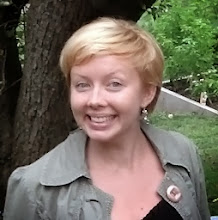
Within my first month at post I was introduced to Olonowo-n'djo Tchala. Tchala was born in my village—and has a whole slew of relations there—but married a Peace Corps volunteer several years ago and then moved to Seattle, Washington. There, he maintained his ties to Togo and started a fair trade company selling shea butter products. The shea butter is produced in the outskirts of Sokodé (my regional capital in Togo) and employs several women from the surrounding villages.
During his trip to visit the new production facility, Tchala invited me to spend the day with him and his party of travelers from the States. First, I met at his sister's house for breakfast: corn porridge with condensed milk and sugar and citronelle-flavored coffee. Over breakfast I met his friends that had traveled with him from the States and Abel, a very ambitious Beninese who works in Togo doing feasibility studies for local products and seeking foreign investment.
We then strolled about 1 km to the outskirts of Sokodé, where the Agbanga-Karite Group were busy working in their new—and immaculate—facility. The women rushed out to greet us in brightly colored dress and beautifully woven tissue. Some were Kotokoli, some Kabiye, some Fulani. But they were all very happy to have found such good employment and to work together. When we entered, we took off our shoes and watched a group of women singing and pre-washing the nuts with their feet and hands. During the tour, the most high tech item that could be found was a milling machine. Then I sat down and whipped some butter myself. My hands felt amazingly soft and smooth after.
We returned to the house of Tchala's sister for a lunch of black-eyed peas with gari and avocado. And to wash it all down—some tchouk! It was delicious! But then it was time to get ready for the party ...
Hiking 3 kilometers outside of the city then, the Fulani women hosted us in their village for one of their almost-weekly parties. Any excuse for a party in Togo! The afternoon began with brief sparing between the boys and younger men using sticks or wadded palm leaves. The girls, women, and men then took their turns on the dance floor while others managed the crowd whacking at their feet with brooms of palm leaves. They had carefully folded palm leaves wrapped around their ankles to create a swishing noise as they danced about. After sharing thanks between the parties for the occasion we sped out across the dance floor ourselves. It was a full day!
A shameless plug ... Please visit the Agbanga-Karite Group's website for more information about their work and also a brief history of my village, Kaboli. If your interested in fair-trade shea butter products (very good for your skin!), please visit the website for Alaffia Fair-Trade.
